|
|
|
Sort Order |
|
|
|
Items / Page
|
|
|
|
|
|
|
| Srl | Item |
| 1 |
ID:
153936


|
|
|
|
|
| Summary/Abstract |
Private military and security companies are integral components of the defense and intelligence operations of some of the world's most powerful states. Despite the increasingly pivotal role of contractors, analysts have yet to develop theories explaining when governments should outsource national security responsibilities or what conditions cause private defense markets to function efficiently. This inquiry addresses this gap in the literature by demonstrating that varying market structures—that is, the quantity of firms providing similar services and the number and purchasing power of those buying these services—have significant effects on costs, oversight, and company performance in the private defense industry. A principal–agent framework is developed to explain variation in the performance of firms in different markets across the industry. Evaluation of three private defense markets yields the surprising conclusion that monopsony, rather than a competitive market, is the ideal structure for governments outsourcing aspects of national defense.
|
|
|
|
|
|
|
|
|
|
|
|
|
|
|
|
| 2 |
ID:
091751


|
|
|
|
|
| Publication |
2009.
|
| Summary/Abstract |
Colin Davidson was the British consular official in Japan during and after World War I delegated to run intelligence operations in the country on behalf of the British Indian security authorities. Davidson's original target, Indian revolutionaries based in Japan, soon expanded to include their clandestine links to powerful Japanese political patrons, violating the spirit of the Anglo-Japanese Alliance (1902-23). Davidson's expertise on Japan, combined with intelligence on Japanese ultranationalist support of Indian independence, proved crucial for confirming suspicions about secret Japanese intent against the British Empire, contributing to the decision not to renew the Alliance.
|
|
|
|
|
|
|
|
|
|
|
|
|
|
|
|
| 3 |
ID:
132420
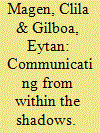

|
|
|
|
|
| Publication |
2014.
|
| Summary/Abstract |
Communicating with the media is an ongoing complicated task intelligence services tackle from the day they are established. The relationship is inherently tense because one side wishes to reveal what the other wishes to conceal, highlighting the constant contradiction between two major principles: the public's right to know versus the government's duty to protect national security. Reconciling these two principles becomes exceedingly complex during crisis situations because both the media and the public demand to know what is happening and why, whereas intelligence services can offer only limited and often incomplete information, a limitation imposed by the need to protect vital secrets. Moreover, the services frequently face a quandary: they are innately secretive and cannot advertise their accomplishments and successes, but these are commonly exposed when they fail. This distorts the natural balance other organizations are generally able to maintain between failures and achievements and any publicity about them.
|
|
|
|
|
|
|
|
|
|
|
|
|
|
|
|
| 4 |
ID:
052666
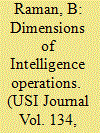

|
|
|
|
|
| Publication |
Apr-Jun 2004.
|
|
|
|
|
|
|
|
|
|
|
|
|
|
|
|
| 5 |
ID:
119414
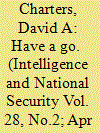

|
|
|
|
|
| Publication |
2013.
|
| Summary/Abstract |
Early in the Northern Ireland conflict the army took the lead in intelligence operations, including Humint. This article examines the case of 'Observer B', an agent run jointly with MI5. Using testimony and documents provided to the Bloody Sunday Inquiry as well as original archival sources, it offers a unique Humint case study that discusses the agent's recruitment, motivation, reliability, handling, product, and utility. This represents the most complete account that we have of this case, but gaps remain. It illustrates some of the limitations of clandestine Humint collection in situations where information may be time-sensitive. The article challenges the conventional wisdom about army/MI5 relations and shows how the two improvised and cooperated in agent-running.
|
|
|
|
|
|
|
|
|
|
|
|
|
|
|
|
| 6 |
ID:
129366
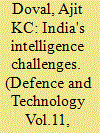

|
|
|
|
|
| Publication |
2012.
|
| Summary/Abstract |
Unlike in the past when it was not a tabooed subject, intelligence has entered the arena of public discourse. We have to accept the reality as it is and not as we wish it to be. Not only the intelligence production -- which can be a legitimate matter of public concern -- but even the processes, structures and systems will increasingly come under public scrutiny. The Intelligence agencies should start deliberating on a public interface mechanism which, in the long run, may even include a media and public relation exercise. In the way Indian democracy is evolving, it will be in the national interest to educate the media and have working relation with it rather than allow it to go haywire for want of knowledge and authentic information. A well thought out action plan on this count may take two to three years before it is made operational.
|
|
|
|
|
|
|
|
|
|
|
|
|
|
|
|
| 7 |
ID:
049069


|
|
|
|
|
| Publication |
London, Frank Cass, 1996.
|
| Description |
228p.
|
| Standard Number |
0714642495
|
|
|
|
|
|
|
|
|
|
|
|
Copies: C:1/I:0,R:0,Q:0
Circulation
| Accession# | Call# | Current Location | Status | Policy | Location |
| 039046 | 327.12/CHA 039046 | Main | On Shelf | General | |
|
|
|
|
| 8 |
ID:
139116


|
|
|
|
|
| Summary/Abstract |
The Romanian anti-communist partisans constituted a small, scattered, diffused, and leaderless movement united only by nationalism and by the belief that armed struggle would contribute to the downfall of an illegitimate regime supported by a foreign power. This article provides an analysis of intelligence and intelligence operations used by the government to defeat these guerrillas, in a conflict that lasted a decade and a half. The sources for this study are mainly the collections of documents of Romanian secret police recently declassified and published.
|
|
|
|
|
|
|
|
|
|
|
|
|
|
|
|
| 9 |
ID:
175642


|
|
|
|
|
| Summary/Abstract |
The information gathered as a result of Russian intelligence activities against Poland serves to discredit Poland as a state co-shaping the Eastern policy of the European Union and NATO. The aim is to reduce Poland’s influence on this policy. The priorities of Russian intelligence in Poland include the energy sector, the armed forces, and allied forces stationed on its territory. Since the conflict in Ukraine in 2014, Polish counterintelligence has noted a significant increase in the activity of Russian intelligence. In addition to classic intelligence activities, the Russians conduct covert actions. Their goal is to exacerbate historical controversies and create the image of Poland as a Russophobic state that is a firm opponent of the improvement of Russia’s relations with the West.
|
|
|
|
|
|
|
|
|
|
|
|
|
|
|
|
| 10 |
ID:
132217
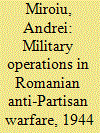

|
|
|
|
|
| Publication |
2014.
|
| Summary/Abstract |
Romanian anti-communist armed resistance has received relatively little attention outside the country, despite its resemblance to other small, diffused, headless insurgencies being fought in the first decades of the twenty-first century. This article deals with military operations mounted against the partisans, with a special focus on tactics such as cordoning, checkpoints, patrols, sweeps, ambushes, and informed strikes. Based mostly on primary sources, it highlights success and failure against determined and elusive guerrillas.
|
|
|
|
|
|
|
|
|
|
|
|
|
|
|
|
| 11 |
ID:
127723


|
|
|
|
|
| Publication |
2014.
|
| Summary/Abstract |
In 2009, a review of the New Zealand intelligence community, the Murdoch Report, recommended increased coordination and reform to the operation of agencies. Since then, the experience of increasing coordination in New Zealand has been more constructive than in other capitals. Reorganizing the intelligence community revolves around relocating multiple agencies within Pipitea House and the creation of a 'one community, many agencies' dynamic. The creation of the Intelligence Coordination Group and an expanded role for the National Assessments Committee plays a vital role in aligning agency priorities. Agencies have also begun to slowdown the assessment process and are introducing new procedures for the analysis and discussion of intelligence products.
|
|
|
|
|
|
|
|
|
|
|
|
|
|
|
|
| 12 |
ID:
137139
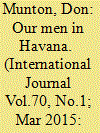

|
|
|
|
|
| Summary/Abstract |
Diplomats based at the Canadian embassy in Havana conducted extensive foreign intelligence operations in Fidel Castro’s Cuba from the early 1960s through the early 1970s. They collected human intelligence of both a political and military nature, using covert as well as overt means. They did so generally at the behest of the United States, and undertook specific “tasked” operations on request from the State Department and the US intelligence community. The diplomat-spies also collaborated operationally with United Kingdom personnel. This article represents the first detailed survey of the Cuba operations and attempts to place Canada’s foreign intelligence program in the context of its relations with the United States and of Canadian foreign policy generally.
|
|
|
|
|
|
|
|
|
|
|
|
|
|
|
|
| 13 |
ID:
145317


|
|
|
|
|
| Summary/Abstract |
In wartime, border controls on the movements of individuals increase tremendously, because national authorities become additionally concerned that spies from an enemy state might seek to enter the country to gather information or conduct other covert operations. Historically, the need to identify potential enemies has led states to adopt instruments by which to associate a certain name with a place of origin. The best known of these tools is the passport. That a rudimentary form of passport was introduced as early as during the French Revolution to prevent counter-revolutionary agents from mingling with other travelers in order to safely cross borders is no coincidence. A similar control method was put in place during the Napoleonic Wars.1 Interestingly, serious passport control almost fell into disuse all throughout the 19th century, when economic prosperity and overall political stability positively encouraged free movement of individuals as a driving force for further development, only to be resumed as late as during the First World War, remaining permanent since then.2 In conflict zones, such controls are more stringent than in areas of the world where two or more states have created strong political and economic bonds. Europe's Schengen area, giving almost unlimited access across borders, is the most obvious example of discrepancy in the mobility of European and non-European citizens.
|
|
|
|
|
|
|
|
|
|
|
|
|
|
|
|
| 14 |
ID:
171244
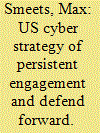

|
|
|
|
|
| Summary/Abstract |
This article evaluates the implications of U.S. cyber strategy of persistent engagement for the alliance and intelligence collection. Whilst the strategy may have benefits for certain alliance relationships, I identify four potential negative consequences; loss of allied trust, disruption allied intelligence operations and capabilities, exploitability of the strategy by adversaries, and the implementation (and justification) of persistent engagement by other countries. This paper concludes suggesting several ways forward, including the creation of a new NATO-memorandum of understanding on cyber operations.
|
|
|
|
|
|
|
|
|
|
|
|
|
|
|
|
|
|
|
|
|